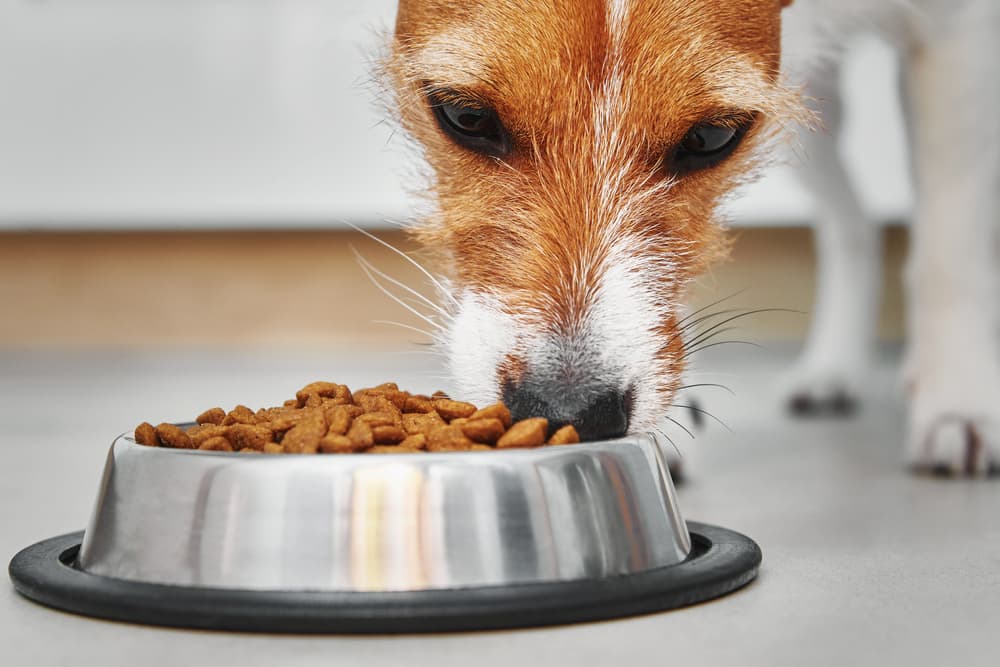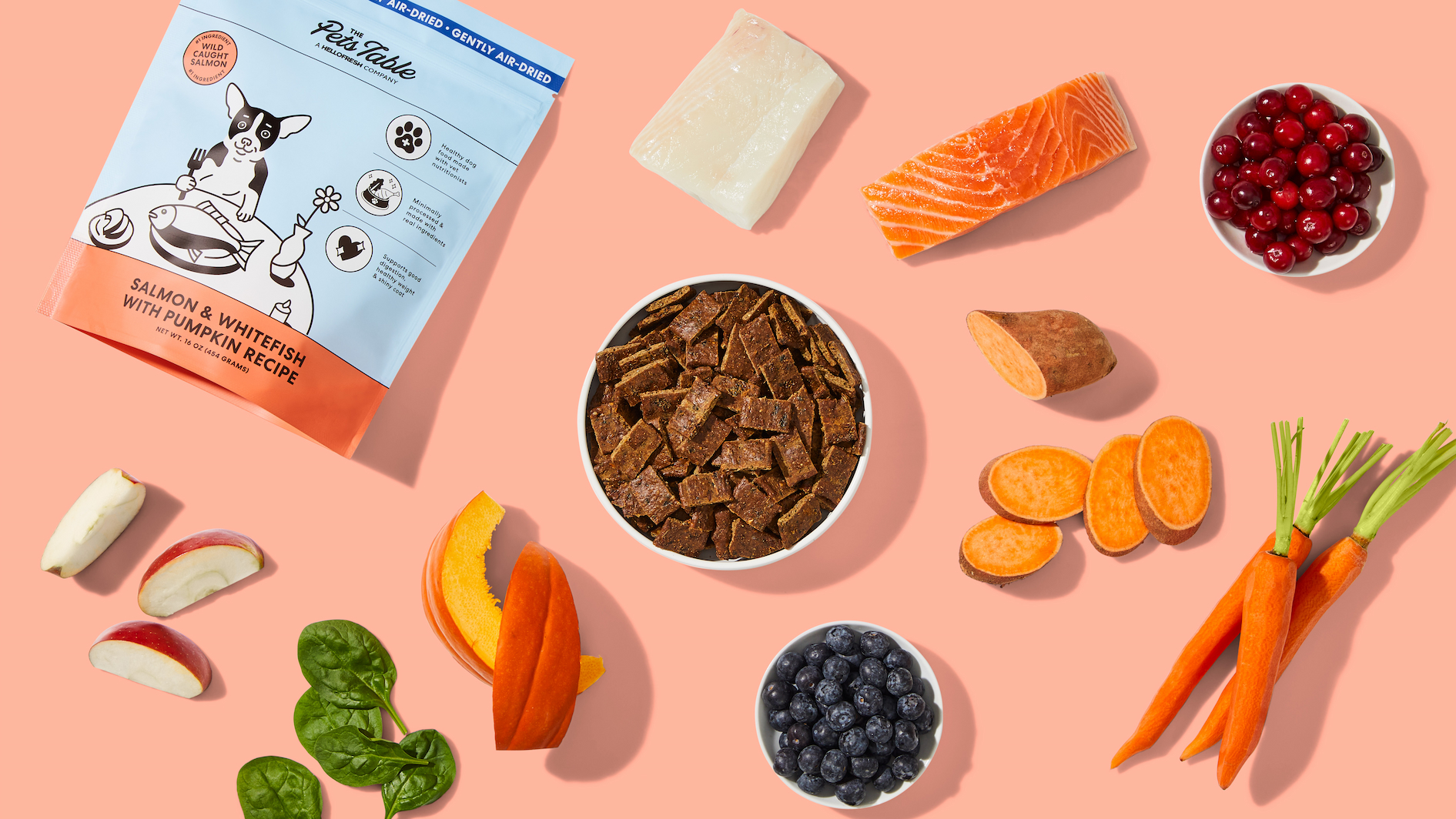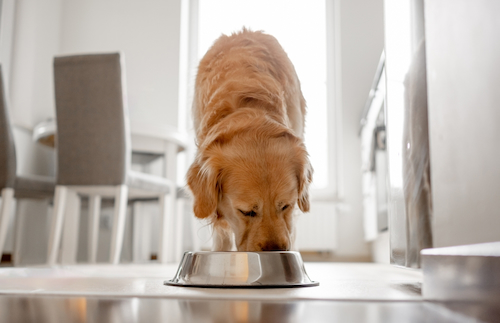12 Recommended Dog Foods for Allergies in 2025
Reviewed by Catherine Barnette, DVM. Updated on October 04, 2024

If your dog has been experiencing itching and skin irritation, there are a variety of medical issues that could be causing the symptoms, including a food allergy. Food allergies among dogs aren’t that common—according to research from Banfield Pet Hospital, just 0.2 percent of dogs are affected by food allergies, whereas around 3.6 percent have environmental allergies. However, if your dog is allergic to an ingredient in their food, it’s important to have the allergy diagnosed by a veterinarian and find an appropriate treatment, which usually involves changing their food.
The following is what you need to know about dog food allergies, what causes them, and the best dog food for allergies to help your pet start feeling better.
12 Recommended Dog Foods for Allergies: Our Top Picks
All featured products are chosen at the discretion of the Vetstreet editorial team and do not reflect a direct endorsement by the author. However, Vetstreet may make a small affiliate commission if you click through and make a purchase.
- Overall Dog Food for Allergies: JustFoodForDogs Custom Diet
- Air-Dried Dog Food for Allergies: The Pets Table
- Prescription Dog Food for Allergies: Royal Canin Veterinary Diet Adult Hydrolyzed Protein HP Dry Dog Food
- Prescription Dry Dog Food for Allergies: Hill’s Prescription Diet z/d Skin/Food Sensitivities Dog Food
- Prescription Wet Dog Food for Allergies: Royal Canin Veterinary Diet Hydrolyzed Protein
- Hypoallergenic Dog Food for Allergies: Purina Pro Plan Veterinary Diets Dog Food HA, Hydrolyzed
- Limited Ingredient Dog Food for Allergies: Hill’s d/d Potato & Duck Recipe Dry Dog Food
- Freeze-Dried Dog Food for Allergies: Nulo Freestyle Freeze Dried Raw Dog Food
- Novel Protein Dog Food for Allergies: Wellness Simple Natural Limited-Ingredient Dry Dog Food
- Affordable Dog Food for Allergies: Natural Balance Limited Ingredient Diet
- Puppy Food for Allergies: CANIDAE Pure Limited Ingredient Puppy Food
If your dog has been diagnosed with a food allergy, your vet will likely provide recommendations on an appropriate food for their needs. When dealing with food allergies, common food choices include a hydrolyzed protein diet (sometimes called hypoallergenic dog food), a novel protein diet, or a limited ingredient dog food.
Best Overall Dog Food for Allergies
Our pick: JustFoodForDogs Custom Diet

A JustFoodForDogs Custom Diet is an ideal fresh food diet for dogs with food allergies, as the brand will create a custom recipe based on your dog’s medical records. The brand makes its foods from unprocessed, nutrient-rich ingredients, and its products are freshly prepared and ready for your dog to eat. (Alternatively, you can opt for a DIY kit, which comes with a nutrient blend and recipe to cook your dog’s meals at home.)
To get started with a custom diet, you’ll have a free consultation with the brand’s veterinary team, where you can discuss your dog’s allergies and other nutritional needs. The formulators will review your pet’s medical records, consult with your primary vet, and create a custom diet tailored just to your dog’s needs. JFFD’s Sensitive Skin & Stomach Variety Box is highly digestible, lower in fat, and uses novel ingredients without common allergens. As a bonus, receive a 50 percent discount off your first JFFD variety box.
Highlights:
- Custom food recipe created by veterinary team
- Fresh prepared meals or DIY kits available
- Free initial consultation
- Made from unprocessed, nutrient-rich ingredients
- Food delivered to your door
Things to Consider:
- Very expensive
- Formulation process takes several weeks
- Food must be refrigerated
Best Air-Dried Dog Food for Allergies
Our pick: The Pets Table

Imagine being able to take a quick, simple quiz online, and The Pets Table personalizes the right meal plan for your dog. Choose from the air-dried or other formulas made in the United States. Designed for picky eaters, each recipe is made with superfoods, vitamin A, and postbiotics for gut health. The Pets Table air-dried formulas are a healthy alternative to kibble. The recipes are shelf stable, baked at low temperatures to preserve flavor and nutrition, and are made by the same folks who offer Hello Fresh.
Highlights
- One of the staffers at The Pets Table is one of only 100 Board Certified Vet Nutritionists in the United States.
- Food is cut into digestible pieces that even picky eaters enjoy.
- Four protein and two grain-free options available.
- Easy online quiz with a 2-week trial box available.
- All recipes are balanced and complete for every life stage per AAFCO guidelines.
- A range of recipes are available for dogs that have allergies.
Things to Consider
- Some of the air-dried options contain grains.
- The Pets Table also offers fresh food, a mixed variety, and half fresh.
Best Prescription Dog Food for Allergies
Our pick: Royal Canin Veterinary Diet Adult Hydrolyzed Protein HP Dry Dog Food

If your dog is diagnosed with a food allergy, your vet may prescribe a hydrolyzed protein diet, such as this dry food from Royal Canin. “Prescription diets generally work the best because of the science these companies put behind the food they craft and the consistent quality it provides,” explains Dr. DelGiudice.
This formula is a highly palatable kibble that’s suitable for both adult dogs and puppies, and it’s formulated with hydrolyzed proteins, which are broken down into a small enough size that the nutrients can be absorbed into your dog’s digestive tract with a reduced risk of triggering an immune reaction. The food has omega-3 fatty acids to promote skin and coat health, as well as fiber and prebiotics for healthy digestion.
Highlights:
- Appropriate for adult dogs and growing puppies
- Formulated with hydrolyzed proteins
- Highly palatable dry food
- Omega-3 fatty acids promote healthy skin and coat
- Fiber and prebiotics support healthy digestion
Things to Consider:
- Prescription required
- Expensive
Best Prescription Dry Dog Food for Allergies
Our pick: Hill’s Prescription Diet z/d Skin/Food Sensitivities Dog Food

This dry dog food from Hill’s is another prescription diet option that’s formulated with hydrolyzed proteins to minimize the risk of adverse reactions. It’s made using a single, purified carbohydrate source, and the food is clinically proven to be beneficial to dogs with food allergies and sensitivities. There are no artificial colors, flavors, or preservatives in the kibble, and many pet owners say their dogs love the taste. The food is also formulated with vitamin E and fiber to help support digestive health.
Highlights:
- Formulated with hydrolyzed proteins
- Single carbohydrate source
- No gluten, soy protein, lactose, artificial colors, flavors or preservatives
- Fiber supports healthy digestion
Things to Consider:
- Prescription required
Best Prescription Wet Dog Food for Allergies
Our pick: Royal Canin Veterinary Diet Hydrolyzed Protein Wet Dog Food

If your dog prefers wet food, this prescription diet from Royal Canin is highly palatable and formulated with hydrolyzed proteins for a reduced risk of triggering an allergic reaction. It comes in 13.7-ounce cans and contains an exclusive blend of fibers to support healthy digestion. The wet food also helps to reinforce your dog’s skin barrier thanks to essential nutrients, minimizing the chances of skin irritation and sensitivity. Omega-3 fatty acids will leave your dog’s coat shiny and lush, and pet owners say that their dogs seem to enjoy the taste and texture.
Highlights:
- Highly palatable wet formula
- Formulated with hydrolyzed proteins
- Fiber supports healthy digestion
- Omega-3 fatty acids promote healthy skin and coat
Things to Consider:
- Prescription required
Best Hypoallergenic Dog Food for Allergies
Our pick: Purina Pro Plan Veterinary Diets Dog Food HA, Hydrolyzed

Hypoallergenic dog foods, such as this prescription formula from Purina Pro Plan, are made using hydrolyzed proteins, which are broken down into small components, making them less likely to cause an adverse food reaction. This dry food contains a single carbohydrate source and is highly digestible for maximum nutrient absorption. It contains antioxidants and coconut oil, a source of medium chain triglycerides, and it’s available in 6- and 25-pound bags.
Highlights:
- Formulated with hydrolyzed proteins
- Single carbohydrate source
- Highly digestible dry food
- Approved for all life stages, including puppies
Things to Consider:
- Expensive
- Kibble size may be too big for small breeds
Best Limited Ingredient Dog Food for Allergies
Our pick: Hill’s d/d Potato & Duck Recipe Dry Dog Food

Limited-ingredient dog foods, such as this prescription diet from Hill’s, are specially formulated to support food sensitivities. Prescription limited-ingredient foods are more likely to be created on a dedicated manufacturing line, leading to less cross-contamination risk than over-the-counter limited-ingredient foods. This dry food contains a single source of protein (duck) to avoid common allergens and is free from soy protein. It’s also packed with omega-3 fatty acids to help nourish and condition a dog’s itchy skin.
Highlights:
- Clinically tested nutrition to help avoid adverse food reactions
- Duck is the single source of protein
- Formulated to support digestion, stool quality, and skin and coat health
- Veterinarian recommended
- Available in 8-, 17.6- and 25-pound bags
Things to Consider:
- Prescription required
- Expensive
Best Freeze-Dried Dog Food for Allergies
Our pick: Nulo Freestyle Freeze Dried Raw Dog Food

Freeze-dried dog food is an increasingly popular choice for pet owners, as it offers the benefits of raw food in a shelf-stable form. This freeze-dried food from Nulo Freestyle may be a good choice if your dog has allergies, as it’s made using a single protein source and has a grain-free formula. It comes in beef, duck, turkey, lamb, and salmon formulas, which are made with up to 83 percent raw meat, organs, and bones paired with fruits for high protein and balanced fat levels. The freeze-dried food is made in a USDA-inspected manufacturing facility, but keep in mind that this food only comes in 5- or 13-ounce bags.
Highlights:
- Freeze-dried raw ingredients
- Single protein source
- Can be used as main food or meal topper
- Non-prescription formula
- Made in a USDA-inspected facility
Things to Consider:
- No large package sizes available
Best Novel Protein Dog Food for Allergies
Our Pick: Wellness Simple Natural Limited-Ingredient Dry Dog Food

If your dog is allergic to a common protein like beef or chicken, you may want to switch them to a novel protein dog food, such as Wellness Simple Natural Limited Ingredient. This dry dog food is available in novel protein options like lamb and duck. Formulated for allergy-prone dogs, it is made from a single source of protein and easily digestible carbohydrates. All of the formulas are free from fillers, additives, wheat, corn, dairy, eggs, and artificial preservatives, colors, and flavors.
Highlights:
- Non-prescription formula
- Single protein source
- No gluten or wheat
- Several flavors are available
- Pre- and probiotics for digestive health
Things to Consider:
- May not be suitable for all food allergies
- Some pet owners say their dogs don’t like the smell/taste of this food
Best Affordable Dog Food for Allergies
Our pick: Natural Balance Limited Ingredient Diet

Many of the best dog foods for allergies are quite expensive, costing more than twice as much as regular dog food. If you’re looking for something that’s more affordable, the Natural Balance Limited Ingredient dog food is a popular choice. It comes in several flavors, including salmon, duck, lamb, beef, and chicken, and each formula uses a single protein source. The food contains healthy grains and amino acids for muscle health, and it’s free from soy, gluten, and artificial colors and flavors.
Highlights:
- Several protein options
- Non-prescription formula
- More affordable price
- Single protein source
- No soy, gluten, or artificial colors or flavors
Things to Consider:
- May not be suitable for all food allergies
- Kibble has a hard consistency that older dogs may not be able to chew
Best Puppy Food for Allergies
Our pick: CANIDAE Pure Limited Ingredient Puppy Food

Depending on what ingredients your puppy is allergic to, they may do well on a limited ingredient puppy food like this one from Canidae. It’s made with nine or fewer key ingredients that are easily recognizable, and it’s free from grains, as well as other fillers like corn, wheat, and soy. The dry food is specially formulated to support the needs of growing puppies, and it contains antioxidants and probiotics, as well as a blend of vitamins and minerals to support healthy joints, skin, and coat.
Highlights:
- Limited ingredient diet
- Non-prescription formula
- More affordable price
- Grain-free formula
- Antioxidants and probiotics support digestive and immune health
Things to Consider:
- May not be suitable for all food allergies
What Are Dog Food Allergies?
“Food allergies can cause a lot of distress for both the dogs and their owners,” explains Dr. Melissa M. Brock, DVM. “To understand the causes of food allergies, it’s important to understand how they develop. Food allergies are triggered by an interaction between your dog’s immune system and certain proteins in his diet. These proteins stimulate an immune response that results in inflammation of the skin or gastrointestinal tract, which is why they’re often referred to as ‘allergic reactions.’”
Dogs of all sizes, breeds, and ages can develop food allergies, and it’s important to note that a true allergy is different than a food sensitivity or intolerance. Food sensitivities, which often present similarly to allergies, refer to any adverse food reaction that’s non-immunologic—basically, a food that just doesn’t sit right with your pet’s stomach.
Common Dog Food Allergies

There are several ingredients in dog food that your pet might be allergic to. “The most common food allergens in dogs include beef, dairy products, chicken, eggs, and fish,” explains Dr. Brock. Uncommon food allergens may include:
- Shellfish
- Nuts (including peanuts)
- Wheat
- Corn
- Rice
- Soy
Dog Food Allergy Symptoms

The symptoms of a food allergy in dogs can be subtle, and they may often overlap with symptoms of an environmental allergy. “The symptoms of a dog food allergy are often difficult to diagnose,” explains Dr. Brock. She notes that some of the symptoms you might see include:
- Itching and scratching around the face, paws, and neck
- Redness and swelling of the skin
- Chewing paws or rubbing them against the ground
- Hair loss
Dr. Louis DelGiudice, national emergency medical director at AmeriVet Veterinary Partners, adds that your dog may experience symptoms such as vomiting, diarrhea, and chronic skin and ear infections. There may also be more subtle signs, such as hyperactivity, weight loss, or lack of energy. If you’ve noticed any of these problems with your pet, you’ll want to bring them to the vet for a professional diagnosis.
Dog Food for Allergies: Buyer’s Guide

There are a few types of dog food that are commonly given to dogs with allergies. “Recommended diets for dogs with these allergies would be either novel proteins or a modified protein diet, where proteins are broken down to the amino acids that the body does not react to,” explains Dr. DelGiudice. Modified protein diets are also referred to as hydrolyzed protein diets or hypoallergenic diets, and they’re typically available through veterinary prescription only.
On the other hand, novel protein dog foods are often available over-the-counter. If your dog is allergic to a common protein like beef or chicken, you can try switching them to a food made from an alternative protein source, such as duck, salmon, or turkey. Over-the-counter diets may not completely exclude all other proteins, making them less effective than hydrolyzed protein diets, but they can be effective for mild food allergies.
Another common choice for dogs with allergies is a limited ingredient diet, also called LID. “Limited ingredient foods have fewer ingredients than other types of pet food,” explains Dr. Brock. “This makes them easier to digest and less likely to cause an allergic reaction in your dog.” These dog foods tend to be the most affordable option, and they’re typically made using a single protein source, making it easier to find a formula that won’t trigger your dog’s allergies.
When shopping for any type of dog food, you’ll want to look at the food’s AAFCO Nutritional Adequacy Statement. This statement is typically located on the back of the bag and should indicate that the formula is a “complete and balanced” source of nutrition. The statement will also specify what life stages the food is designed for, such as adults and/or growing puppies.
Dog Food Allergy FAQs
Can dogs develop food allergies?
Dog food allergies are actually developed after your dog has eaten a certain ingredient—often for an extended period of time. “The food protein that triggers an allergic reaction is called an antigen; when your dog eats an antigen-containing protein, his body produces antibodies against it,” explains Dr. Brock. “This process leads to anaphylaxis—an allergic reaction—over time if enough antigens are consumed regularly by your dog.”
How do I know if my dog has food allergies?
There are a variety of symptoms that may indicate that your dog has food allergies, the most common of which are itching, skin irritation, and gastrointestinal problems. Consult with your pet’s veterinarian if you suspect your dog has a food allergy. They’ll work with you to pinpoint the specific ingredient that your dog is having an adverse reaction to, typically by implementing an elimination diet.
Does Benadryl help dogs with food allergies?
Benadryl, or diphenhydramine, can be used to treat mild to moderate canine allergies. Unfortunately, it doesn’t tend to be very effective in the treatment of food allergies. If you think your dog has a food allergy, it’s best to figure out the ingredient they’re allergic to so you can eliminate it from their diet.
Can food allergies cause ear infections in dogs?
Chronic or recurring ear infections can be a sign of a food allergy. However, if your dog gets ear infections seasonally, this suggests an environmental allergy, such as pollen.
Does grain-free dog food help with food allergies?
If your dog is allergic to wheat or another grain, you’ll likely need to switch them to a grain-free dog food. However, grain allergies are rare. A grain-free formula is not beneficial for most dogs with food allergies.





